#Islamic Fatwa Council
Text
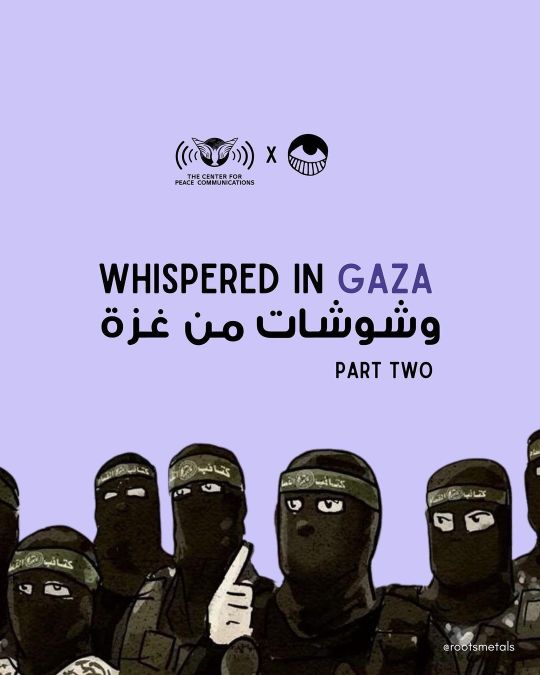
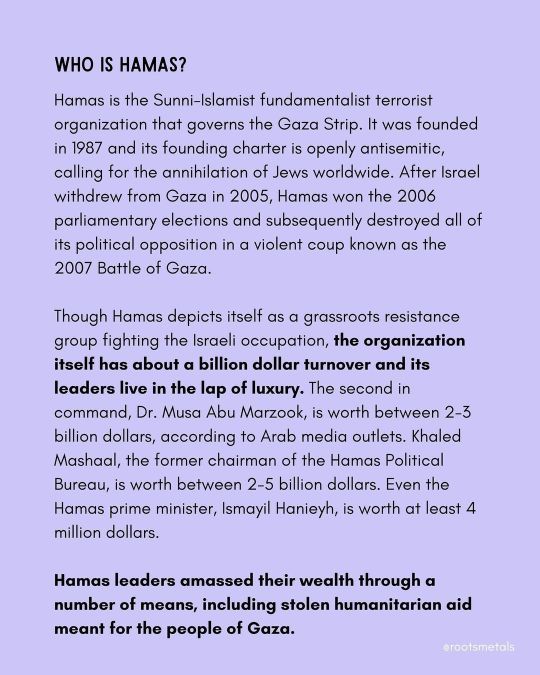
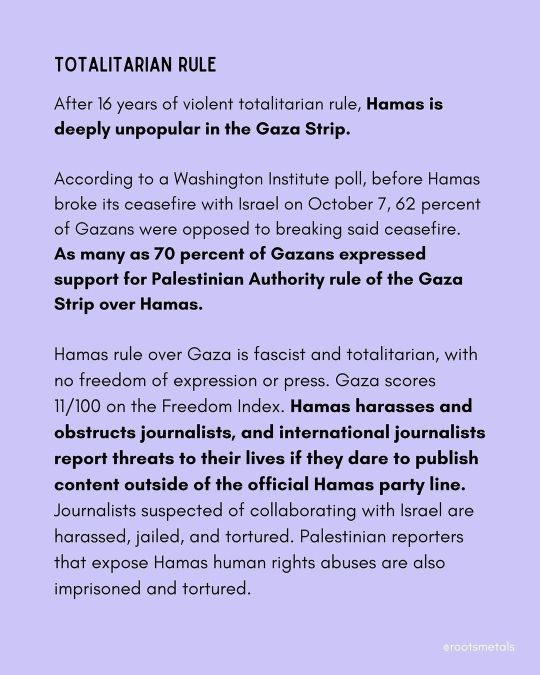
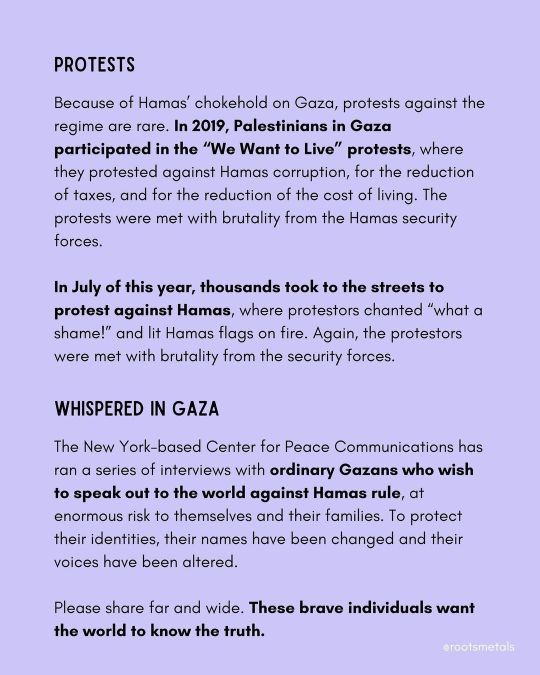
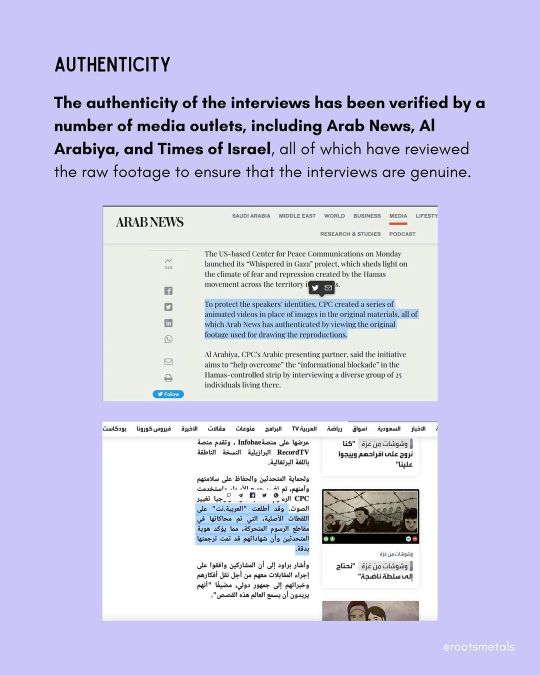

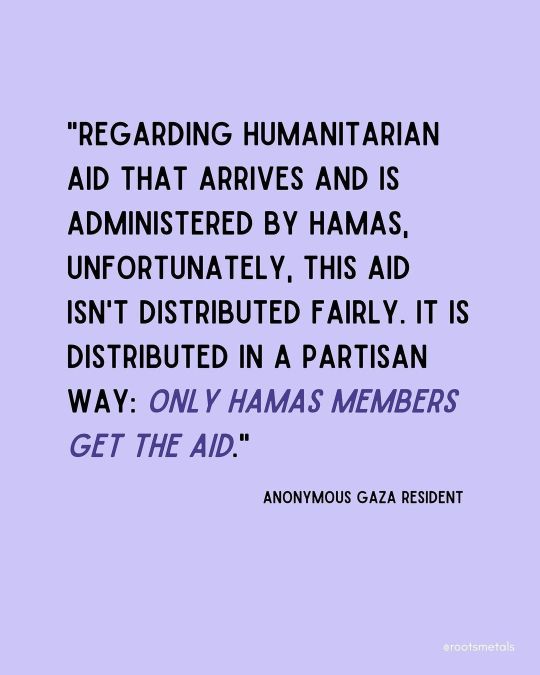
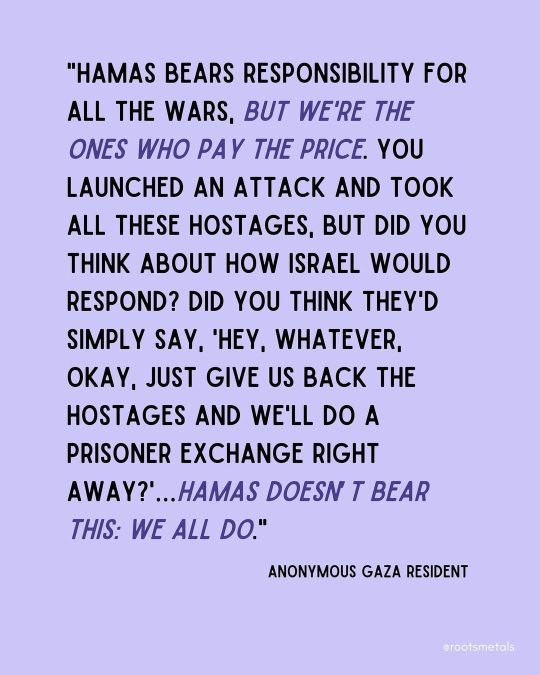

"At this time, as a person living in the prison that is Gaza, my prime, immediate enemy is Hamas. It is a barrier I need to remove from my life. If the Jews come and remove it, I will support them."
-- "Ashraf," 28, recent evacuee from Gaza City
"Regarding humanitarian aid that arrives and is administered by Hamas, unfortunately, this aid isn't distributed fairly. It is distributed in a partisan way: only Hamas members get the aid."
-- Anonymous Gaza resident
"Hamas bears responsibility for all the wars, but we're the ones who pay the price. You launched an attack and took all these hostages, but did you think about how Israel would respond? Did you think they'd simply say, 'Hey, whatever. Okay, just give us back the hostages and we'll do a prisoner exchange right away?'… Hamas doesn't bear this: we all do."
-- Anonymous Gaza resident
#Whispered in Gaza#Gaza#Gaza Strip#Hamas#free gaza from hamas#free gaza#free palestine#free palestine from hamas#palestine#islamic terrorism#fatwa#Islamic Fatwa Council#Battle of Gaza#humanitarian aid#exterminate hamas#religion is a mental illness
26 notes
·
View notes
Text
Well there's a headline you don't see every day...
8 notes
·
View notes
Note
What's the difference between a Shia & Sunni? And why do they hate each others? (I'm an atheist so I don't know shit about religions)
Keep in mind that this is no way trying to shame or denounce my Sunni siblings, but I do believe it's important to highlight a historical fact and how it's detrimental to the current geopolitical situation, since we're embittered by historical events, while at the face of imperalism and colonialism.
Shi'as are a political group of people who iunitially held that Ali (a), the cousin of Muhammed (pbuh&hf) was the successor of the Prophet. This is evident in numerous hadiths, such as Hadith Ghadeer Khumm, the Hadith of Mubahila and the Hadith at Thaqalayn. Nevertheless, the issue steems from the incident at Saqifa, which was a council met by some companions by the Prophet, who held an abrupt meeting, discussing who'd lead the Muslim nation following the Prophet's death. The meeting was held without consulting Ali (a) and they chose Abu Bakr to become the caliph. As a result, Ali (a) did nor approve of the selection and did not pledge his allegience to Abu Bakr. the incident at Saqifa serves as a catalyst to the incidents that would befall the Muslim community, such as Fatimah's (a) miscarriage and the subsequent wars against Ali (a) by some of the Prophet's companions, Ali (a) and his sons Hassan (a) and Hussain's (a) martyrdom.
This caused the rift in the nascent Islamic community, the Shi'as were any Muslim who held that Ali (a) was the successor by divine right, and swore their allegience to Ali (a), while the rest of the Muslims were nonpartisans. Sunni Islam is the standardization of Islamic scholastic and jurisdictional opinions which were formed in the Abbasid caliph. So it's errounous to assume that there was a split between Sunnis and Shi'as, when Sunni Islam was formed a few centuries later.
The reason for the hate is because of fundamentalist attitudes toward Shi'as. Some Sunnis and Salafis believe that Shi'a Muslims are heretics, because of their veneration of saints and the importance of Shrine visitations, the other reason is because Shi'a Muslims practice the doctrine of dissociation, which is the belief that any of the enemies of the Prophet's household should be cursed, thus some of the personalites of the Sunnis are cursed by Shi'as. Ancient scholars, suchs as Ibn Taymiyyah and Ibn Qayyim placed some fatwas declaring Shi'a Muslims to be heretics. These scholars' opinions are still popular today and used as pretext for prejudice against Shi'as.
In a geopolitical context, Iran is often considered to be rivaling power to Saudi Arabia's Wahhabism, and have often threatened the Saudi hegemony. Because of the Axis of resistance and their growing influence in the SWANA region, the Gulf States have attempted at all cost to undermine the growing sympathy for Shi'as. Bahrain is upholding an apartheid against it's Shi'i majority, The Saudi refuses to ackowledge the Shi'i Houthis in Yemen, but supported the Hadi government, thus imposing a devastating blockade. The Iraqi war saw the Shi'as gain power, while the Sunnis were often a disenfranchised group following the Blackwater massacre, which contributed the rise of various militias and terrorist groups, such as ISIS. While in the Syrian Civil War, Shi'as mostly made up the bulk of resistance fighters that sided with Assad against the Free Syrian army and Salafi Islamist groups, such as, Tahrir al-Sham, Jaysh al-Sunnah, Islamic front, Ahrar al-Sham and etc. These have contributed to the increase of tension between Sunnis and Shi'as. However, the fight against Israel have united Muslims, but the biggest obstacle the Muslim community must get through are the Salafist and Wahhabi clerics, espousing tayyafiyah (sectarianism)
92 notes
·
View notes
Text
RULING ON SMOKING
(Perfect and complete) Praise (with love and veneration) be (exclusively) to Allāh alone, and may Allāh confer the Highest Praise, Blessings and Peace upon our prophet, his family and Companions, as to what proceeds:
The Permanent Committee for Scholarly Research and Ifta' has read the Fatwa request submitted by His Eminence the Judge of Al-Bahah Court, Shaykh Abdul-Hayy ibn Hasan Kamal, to His Eminence Head of the Departments of Scholarly Research, Ifta', Dawah and Guidance under Number 323, dated 24/5/1391 A.H., that was referred by the General Secretariat of the Council of Senior Scholars under Number (2/242), on 26/3/1392 A.H.
Having studied the inquiry, the Committee understood that you asked for a Fatwa concerning what was mentioned by a preacher, that a smoker is not a Mu'min (believer); he does not enter Jannah (Paradise); and his testimony is not taken into account.
The Committee answered that smoking cigarettes is one of the sins.
If a person dies while committing a sin, they are left to the Will of Allah;
He can punish them in Hellfire and then let them enter Jannah;
or He can forgive them and let them enter Jannah without delay.
As for the ruling on them in this world, they are Mu'mins but also Fasiqs (someone flagrantly violating Islamic law) due to committing a major sin.
This is the view of Ahl-ul-Sunnah wal-Jama`ah (adherents to the Sunnah and the Muslim mainstream).
May Allāh grant us success, may Allāh confer the Highest Praise, Blessings and Peace upon our Prophet Muḥammad, his family, and all his Ṣaḥābah.
Group 1, Vol no. 22, page no. 176-178, Fatwa no. 32, The Permanent Committee for Scholarly Research and Ifta' [Member : Abdullah ibn Ghudayyan, Deputy Chairman : Abdul-Razzaq Afify, Chairman : Abdul-Aziz ibn Abdullah ibn Baz]
3 notes
·
View notes
Text
Just read smth written by a Muslim man who lives in a very northern part of the world about how in previous years when Ramadan fell in the summer* he had like 19 hour long days of fasting.
Which besides already being (respectfully) super intense, lead me to wonder how observing Muslims deal with places where the sun just does not set in the summer. Obviously nobody would tell you to literally just eat and drink nothing for the entire month so... Would you follow sunrise and sunset times in Mecca maybe? Would you do that every year, also when the sun does set? And similarly, would you not need to fast in the winter??
Quick answer is there is not one true answer. The Islam doesn't have a central authority, so rulings like these (fatwas) are made by (councils of) qualified scholars (muftis). This means that different muftis can provide different fatwas, and it is up to the individual to choose which mufti or council to follow.
After some digging I found some fatwas, some of which state that you can use the time in Mecca or the closest Muslim country, others of which (including this one by the Council of Senior Scholars, which also discusses prayer times) stating that you can use the time in the nearest city or country where "night can be distinguished from day" in a period of 24 hours. I'm guessing that also means that when Ramadan falls during a period when night is distinguishable from day in the location in question you could just use local times. Though I suppose details like those and where to draw the line can be filled in by a local mufti.
Just thought that was interesting.
Ramadan Mubarak :]
*Ramadan isn't tied to the Gregorian (solar) calendar but to the Islamic (lunar) calendar which has 354 days instead of 365, so Islamic holidays shift "backwards" by eleven days in the Gregorian calendar every year.
#full disclosure that im OBVIOUSLY not an authority here im not even muslim i was just curious and wanted to share what I found#I always do research and look at several different sources before I post anything but this is all very new to me so it's#always possible that I make a mistake.#obviously if you need to know more on this please refer to actual fatwas or like ask a mufti about it#as always let me know if i said something wrong <3#or if you have more info to add!#even if it's only vaguely related. i crave knowledge :)#ramadan#islam#religion
1 note
·
View note
Text
Facts of Morocco's Constitution
Preamble (Part of it)
A sovereign Muslim State, attached to its national unity and to its territorial integrity, the Kingdom of Morocco intends to preserve, in its plentitude and its diversity, its one and indivisible national identity. Its unity, is forged by the convergence of its Arab-Islamist, Berber [amazighe] and Saharan-Hassanic [saharo-hassanie] components, nourished and enriched by its African, Andalusian, Hebraic and Mediterranean influences [affluents]. The preeminence accorded to the Muslim religion in the national reference is consistent with [va de pair] the attachment of the Moroccan people to the values of openness, of moderation, of tolerance and of dialog for mutual understanding between all the cultures and the civilizations of the world.
Founded on these values and these immutable principles, and strong in its firm will to reaffirm the bonds of fraternity, or cooperation, or solidarity and of constructive partnership with all other States, and to work for common progress, the Kingdom of Morocco, [a] united State, totally sovereign, belonging the Grand Maghreb, reaffirms that which follows and commits itself:
To work for the construction of the Union of the Maghreb, as [a] strategic option;
To deepen the bonds of togetherness with the Arab and Islamist Ummah [Oumma], and to reinforce the bonds of fraternity and of solidarity with its brother peoples;
This Preamble is made integral part of this Constitution.
Article One (Part of it)
Morocco is a constitutional, democratic, parliamentary and social Monarchy.
The constitutional regime of the Kingdom is founded on the separation, the balance and the collaboration of the powers, as well as on participative democracy of [the] citizen, and the principles of good governance and of the correlation between the responsibility for and the rendering of accounts.
The Nation relies for its collective life on the federative constants [constantes federatrices], on the occurrence of moderate Muslim religion, [on] the national unity of its multiple components [affluents], [on] the constitutional monarchy and [on] democratic choice.
The territorial organization of the Kingdom is decentralized. It is founded on an advanced regionalization.
Article 3
Islam is the religion of the State, which guarantees to all the free exercise of beliefs [cultes].
Article 41
The King, Commander of the Faithful [Amir Al Mouminine], sees to the respect for Islam. He is the Guarantor of the free exercise of beliefs [cultes].
He presides over the Superior Council of the Ulema [Conseil superieur des Oulema], charged with the study of questions that He submits to it.
The Council is the sole instance enabled [habilitee] to comment [prononcer] on the religious consultations (Fatwas) before being officially agreed to, on the questions to which it has been referred [saisi] and this, on the basis of the tolerant principles, precepts and designs of Islam.
The attributions, the composition and the modalities of functioning of the Council are established by Dahir [Royal Decree].
The King exercises by Dahirs the religious prerogatives inherent in the institution of the Emirate of the Faithful [Imarat Al Mouminine] which are conferred on Him in exclusive manner by this Article.
Article 42(Part of it)
The King Head of State, His Supreme Representative, Symbol of the unity of the Nation, Guarantor of the permanence and of the continuity of the State and Supreme Arbiter between the institutions, sees to respect for the Constitution, to the good functioning of the constitutional institutions, to the protection of democratic choice and of the rights and freedoms of the citizens [feminine] and citizens [masculine], of the collectivities, and to respect for the international commitments of the Kingdom.
He is the Guarantor of the Independence of the country and of the territorial integrity of the Kingdom within its authentic frontiers.
The King exercises these missions by Dahirs by virtue of the powers that are expressly devolved to him by this Constitution.
Article 43
The Crown of Morocco and its constitutional rights are hereditary and are transmitted from father to son through male descendants in direct line and by order of primogeniture of His Majesty The King Mohammed VI, unless the King has designated, in His lifetime, a successor from among His sons, other than His eldest son. When there are no male descendants in direct line, the succession to the Throne is devolved in the closest male collateral line and in the same conditions.
Article 44
The King is a minor until reaching eighteen years [of age]. During the minority of the King, a Council of the Regency [Conseil de Regence] exercises the powers and the constitutional rights of the Crown, except those relative to the revision of the Constitution. The Council of the Regency shall function as [a] consultative organ before the King until the day [when] he has attained the age of eighteen years.
The Council of the Regency is presided over the President of the Constitutional Court. It is composed, moreover, of the Head of Government, of the President of the Chamber of Representatives, of the President of the Chamber of Councilors, of the President-Delegate of the Superior Council of the Judicial Power [President-delegue du Conseil Superieur du Pouvoir Judiciare], of the Secretary General of the Superior Council of the Ulema and of ten prominent persons [personnalites] appointed by the King intuitu personae.
The rules of functioning of the Council of the Regency are established by an organic law.
Article 53
The King is the Supreme Head of the Royal Armed Forces. He appoints to the military offices [emplois] and can delegate this right.
Article 58
The King exercises the right of pardon.
by Dunilefra, working for Political Reform
#Morocco#Dunilefra#Politics#Political Reform#World Politics#World Order#Fundamental Rights#Human Rights#Economy#Religion#State Policy#Political Analysis#Constitution#Constitutional Law
0 notes
Text
Events 12.8 (before 1960)
395 – Later Yan is defeated by its former vassal Northern Wei at the Battle of Canhe Slope.
757 – The poet Du Fu returns to Chang'an as a member of Emperor Xuanzong's court, after having escaped the city during the An Lushan Rebellion.
877 – Louis the Stammerer (son of Charles the Bald) is crowned king of the West Frankish Kingdom at Compiègne.
1504 – Ahmad ibn Abi Jum'ah writes his Oran fatwa, arguing for the relaxation of Islamic law requirements for the forcibly converted Muslims in Spain.
1660 – A woman (either Margaret Hughes or Anne Marshall) appears on an English public stage for the first time, in the role of Desdemona in a production of Shakespeare's play Othello.
1851 – Conservative Santiago-based government troops defeat rebels at the Battle of Loncomilla, signaling the end of the 1851 Chilean Revolution.
1854 – In his Apostolic constitution Ineffabilis Deus, Pope Pius IX proclaims the dogmatic definition of Immaculate Conception, which holds that the Blessed Virgin Mary was conceived free of Original Sin.
1864 – Pope Pius IX promulgates the encyclical Quanta cura and its appendix, the Syllabus of Errors, outlining the authority of the Catholic Church and condemning various liberal ideas.
1907 – King Gustaf V of Sweden accedes to the Swedish throne.
1912 – Leaders of the German Empire hold an Imperial War Council to discuss the possibility that war might break out.
1914 – World War I: A squadron of Britain's Royal Navy defeats the Imperial German East Asia Squadron in the Battle of the Falkland Islands in the South Atlantic.
1922 – Two days after coming into existence, the Irish Free State executes four leaders of the Irish Republican Army.
1941 – World War II: U.S. President Franklin D. Roosevelt declares December 7 to be "a date which will live in infamy", after which the U.S. declares war on Japan.
1941 – World War II: Japanese forces simultaneously invade Shanghai International Settlement, Malaya, Thailand, Hong Kong, the Philippines, and the Dutch East Indies. (See December 7 for the concurrent attack on Pearl Harbor in the Western Hemisphere.)
1943 – World War II: The German 117th Jäger Division destroys the monastery of Mega Spilaio in Greece and executes 22 monks and visitors as part of reprisals that culminated a few days later with the Massacre of Kalavryta.
1953 – U.S. President Dwight D. Eisenhower delivers his "Atoms for Peace" speech, which leads to an American program to supply equipment and information on nuclear power to schools, hospitals, and research institutions around the world.
1955 – The Flag of Europe is adopted by Council of Europe.
1 note
·
View note
Text
Efforts to Harmonize Idulfitri Time: Denny Ja suggests the Global Hijri calendar
Indonesia, as the country with the largest Muslim population in the world, has a challenge in uniting the time of Idulfitri in all regions. Every year, there are differences in determining the beginning of the month of Shawwal, which determines the start of the holy month of Ramadan and Idulfitri. However, an interesting advice has now emerged from Denny JA to introduce the Global Hijri calendar that can harmonize the time of Idulfitri worldwide.
In an exclusive interview with Denny JA, a leading intellectual figure in Indonesia, he explained the need for the harmonization of Idulfitri time. Denny JA views that the difference in determination of the beginning of the month of Shawwal in various Muslim countries often causes confusion and confusion among Muslims. Sometimes, a country that is close to the geographical close has a different Eid dates, which can interfere with the same celebration in the spirit of togetherness and unity.
Denny Ja proposed the adoption of the Global Hijri calendar as a solution to overcome this problem. This calendar will be a joint reference for all Muslim countries in the world to determine the beginning of the month of Shawwal and the time of Idulfitri. Thus, all Muslims in various parts of the world will celebrate Idulfitri simultaneously on the same date. This will strengthen the sense of unity and strengthen relations between Muslim countries throughout the world.
In Denny Ja's view, the adoption of the Global Hijri calendar will not only bring benefits in terms of harmonization of Eid al -Fitr, but will also support the development of Muslims as a whole. Denny Ja argued that with a uniform calendar, Muslim countries can work together and work together more effectively in the economic, political, and social fields. This will strengthen the position of Muslims in the world and open new opportunities for mutual progress.
However, Denny Ja also realized that the implementation of the Global Hijri calendar was not easy. He highlighted that there will be challenges in uniting various opinions and local traditions in Muslim countries. Denny Ja argues that open dialogue and intense discussion will be the key to reaching a global agreement regarding the adoption of this calendar. In this process, Muslim countries need to cooperate with leading Islamic institutions such as the Islamic Conference Organization (OKI) and the National Fatwa Council to achieve strong consensus and represent the voices of Muslims as a whole.
In his conclusion, Denny Ja views that the efforts of the harmonization of Eid al -Eid through the adoption of the Global Hijri calendar are important steps that need to be considered by Muslim countries around the world. With this uniform calendar, Muslims will be able to celebrate Idulfitri simultaneously and with a stronger spirit of togetherness. In addition, the adoption of the Global Hijri calendar will also bring benefits in the economic, political, and social fields for Muslim countries. Although the challenge exists, Denny Ja invites all parties to be involved in intense dialogue and discussion to reach a global agreement that is beneficial to all Muslims.
Check more: Efforts to harmonize Idulfitri time: Denny JA suggests the Global Hijri calendar
0 notes
Text
youtube
Shaykh Dr Haitham al-Haddad is a jurist and UK based Scholar who currently serves as the Chair of the Fatwa Committee for The Islamic Council of Europe. He has studied Islamic sciences for over 20 years under the tutelage of renowned scholars. He obtained his doctorate on the jurisprudence of Muslim Minorities from SOAS. He specialises in many of the Islamic sciences and, together with his academic background, has an ocean of experience in helping people use Islamic principles as solutions for their everyday lives. He has over the course of the past decade dealt with several hundred cases.
0 notes
Text

Dr Haitham Al Haddad
Chair of the Fatwa Committee of the Islamic Council of Europe and Renowned Da’ee of Islam
1 note
·
View note
Text

The Islamic Fatwa Council has issued a fatwa explicitly banning Hamas and supporting the rights of Palestinians that are being violated in Gaza.
The first of its kind, the fatwa condemns Hamas and blames it directly for the violations and oppression in Gaza.
The fatwa forbids joining or praying for Hamas, as well as funding or fighting for it. It judges Hamas unequivocally responsible for its own corrupt rule and affirms that the Muslim Brotherhood in all its branches is a terror organization violating the tenets of the Islamic faith.
The fatwa, released recently, was issued by three renowned Muslim jurists from Iraq and Pakistan, led by Grand Ayatollah Fadhel al-Budairi; Sheikh Abdallah al-Dheeban, the Sunni Grand Mufti of Wasit Governorate; and Pakistan's Peer Syed Mudassir Nazar Shah, from the International Sufi Council.
We have seen what Gaza is subjected to under Hamas's rule, and the atrocities, in our view, which it has perpetrated against Palestinians faithful, unarmed [civilians] who have neither strength nor recourse. And so we believed it was our Islamic obligation to aid the oppressed. Our faith, in its wisdom, enjoins us to be "an enemy to the oppressor and an aid to the oppressed." That is why the fatwa was issued against Hamas.
-- Sheikh Muhammad Ali al-Maqdisi, Spokesman for the Islamic Fatwa Council
The Islamic authority Grand Ayatollah al-Budairi stressed that no one is beyond blame for the harm done to the Palestinian people - even those who think of themselves as "leaders" claiming to represent the Palestinians.
We, as an Islamic authority, stand with the oppressed Palestinian people, and we do not accept that any harm be done to them, whether by Israel or Palestinian governing elements, be they from Hamas or others. These officials are supposed to bear responsibility to protect the Palestinian people.
-- Grand Ayatollah Fadhil al-Budairi, Chairman, Islamic Fatwa Council
Fatwa Council spokesman Muhammad Ali al-Maqdisi, a scholar and lecturer at the Islamic seminary in Najaf, explained in an interview with the French magazine L'Obs that one of the motivations for issuing this fatwa was the suffering of the people of Gaza as exposed in the video series "Whispered in Gaza."
When these videos appeared, nearly everyone who follows Palestinian affairs saw them. I'm referring to the series "Whispered in Gaza." In these videos, numerous inhabitants of Gaza - men, women and children - describe what they've been subjected to because of Hamas's corruption. They testified before the world to the many forms of extortion and intimidation they've suffered. Every human being should heed this testimony. As complaints about Hamas's behavior toward the unarmed and poor Palestinian people increased, this gave us the impetus and clarity to issue a fatwa against Hamas.
-- Sheikh Muhammad Ali al-Maqdisi, Spokesman for the Islamic Fatwa Council
Beyond reflecting a religious view or position, the fatwa heralds a new, courageous approach calling on other fatwa councils, institutions and leaders in the Islamic world to reinforce the fatwa - and build on its accompanying juridical findings as well as Shari'ah and Islamic law overall.
We expect that society writ large will support the oppressed in Gaza. We believe that all Muslim clerics who adhere to their true responsibilities must take the same position. This is what we believe.
-- Sheikh Muhammad Ali al-Maqdisi, Spokesman for the Islamic Fatwa Council
The fatwa is in accord with Islamic organizations in the Arab Gulf - including the UAE Fatwa Council and the Council of Senior Scholars in Saudi Arabia - which have designated the Muslim Brotherhood in all its branches a terror organization.
Of note, Sheikh al-Budairi met with Sheikh Dr. Mohammad al-Issa, Secretary General of the Muslim World League, in Mecca at the beginning of this year - an indication that the views of the two organizations and their leaders are aligning.
--
The Fatwa (English version):

--
More:
#Whispered in Gaza#gaza#Gaza Strip#Hamas#palestine#free gaza from hamas#free gaza#free palestine from hamas#exterminate hamas#islamic terrorism#fatwa#Islamic Fatwa Council#islam#terrorist organization#fatwa against hamas#human rights violations#religion is a mental illness
10 notes
·
View notes
Text
Gambia Supreme Islamic Council Issues Fatwa condemning anyone who denounces Female Genital Mutilation... Sorry "Female Circumcision" urging to repeal it's ban 8 years ago via /r/atheism
Gambia Supreme Islamic Council Issues Fatwa condemning anyone who denounces Female Genital Mutilation... Sorry "Female Circumcision", urging to repeal it's ban 8 years ago
https://ift.tt/8O24JKk
Submitted October 11, 2023 at 10:58AM by Emeja
(From Reddit https://ift.tt/x8Gkn4j)
0 notes
Link
The Iraqi-based Islamic Fatwa Council has called Hamas’ treatment of millions of Palestinians living under its rule in the Gaza Strip "inhumane" and "illegitimate."
0 notes
Text
Is IVF Treatment Haram in Islam?

In vitro fertilization (IVF) is a fertility treatment that allows people who are infertile to conceive a child. In vitro fertilization (IVF) is the procedure of extracting an egg from a woman’s eggs and fertilizing it in a laboratory with sperm. The fertilized egg is the embryo. It is implanted in a woman’s womb to continue developing and expanding. You can utilize donor sperm or your own eggs and/or sperm.
IVF success rates can be affected by your age and the root cause of your infertility. IVF can also be costly, time-consuming, and obtrusive. In vitro fertilization (IVF) can result in multiple pregnancies if more than one embryo is implanted into the uterus.
What Happens in IVF?
Decapeptyl injection is given to the lady to prepare her for the hormone injections that will cause her to discharge a large number of eggs. The lady is given an HCG dose to complete developing the eggs. This injection is normally given 36 hours before egg extraction. IVF involves six distinct stages. These stages are described below-
1. Stopping your regular cycle: Medications can be used to stop your menstrual cycle.
2. Help your ovaries produce more eggs: Your ovaries are stimulated by medication to release more eggs at once.
3. Tracking your development and creating your eggs: An ultrasound scan is used to monitor the growth of eggs and administer drugs to accelerate their maturation.
4. Extracting eggs: A needle is inserted through your vagina into your ovaries to extract eggs.
5. Fertilising eggs: In order to promote fertilization, the eggs and sperm are mixed for a few days.
6. Transferring embryo(s): Your womb will receive one or two fertilized embryos.
To determine if the procedure was successful, you must wait for two weeks after the embryos have been placed in your womb.
Islam’s Views on Having Children
Unquestionably, children are one of the greatest joys of life and beautification. Having children is also one of the goals of marriage. A happy child is a blessing for his/her parents, both now and in the long term. His/her good deeds will add to the good works of his parents.
A man or woman may be affected by the absence or delay of having children.
It is perfectly acceptable to use a method of childbirth that is permitted by Islamic law. Muslims must be cautious about false paths, such as sihr (witchcraft), myths, and medical professionals whose main concern is making money from people who want to become parents, rather than caring about Allah. They also swap sperm and eggs in some cases. Many scholars have deemed some techniques of conception illegal or have imposed highly strict criteria.
Learn More: Advantages & Disadvantages of IVF Treatment
Is IVF Treatment Haram in Islam?

Muslims understand that everything, including death and life, is in conformity with Allah’s will. Even if infertility exists, attempting to conceive is not regarded as a rebellion against Allah’s will. However, different Islamic scholars have opposing viewpoints.
The majority of current reproductive procedures have just lately been available. Although the Quran and Hadith do not mention particular strategies, scholars have interpreted them to their beliefs.
Following the publishing of suggestions that were authorized by authorities in several Muslim countries, well-known scientific and religious groups, as well as other entities, came out in favor of assisted reproduction.
These regulations included a fatwa of Dar El Iftaa, Cairo (1980), a fatwa of the Islamic Fiqh Council (IFC) in Makkah (1984), a fatwa o the Islamic Organization for Medical Sciences in Kuwait (1983), a fatwa o the International Islamic Centre for Population Studies and Research in Al-Azhar University in 1986 and a fatwa from the International Islamic Centre for Population Studies and Research in Al-Azhar University in 1986. These rules are generally adhered to by Muslims [19].
To be safe, IVF should not be allowed in accordance with the Shari judgment on the subject. All assisted reproductive technologies (ARTs) are allowed under Islamic law, provided the sperm and ovum are from legal weds who are still married. A third party cannot interfere with a couple’s sexual or reproductive activities.
Some authorities believe that IVF should be attempted only after normal man-woman fertilization has failed for at least two years. Children are God-given, according to Islam. IVF is permissible provided the correct procedures are followed. These are the guidelines you should follow-
● If there are female staff members available, the lady shouldn’t reveal her ‘awrah to men.
● Artificial insemination using the husband’s sperm
● It is important to immediately implant the eggs of the woman and the man’s fertilized eggs into her uterus. They should not be kept in a freezer for future use or another session. To avoid them being combined or used for another purpose, you should do it immediately.
● To have a child, the wife must place her egg and her husband’s fertilized eggs in her uterus. Any other behavior is strictly forbidden.
● This treatment should be performed by doctors who have complete faith in Allah
Scholars agree that there are many options for reproductive methods allowed under Islamic law. However, they must be within the boundaries of a married couple. After being fertilized with a husband’s eggs and sperm, the result of in vitro fertilization must be decided.
If IVF is necessary for a woman of faith, she and her husband must be extremely careful to ensure that there is no contamination that could violate Islam’s rules.
Final Word
Artificial insemination must be performed only by the husband and wife. Any other forms of artificial insemination are prohibited. The use of third-party sperm or eggs would be considered a serious sin in Islam. So when the question comes is IVF treatment haram in Islam? The answer is, no. But the condition will be when the husband & wife tried for a baby but they didn’t get it. That’s when they can try IVF but cannot use a third party’s sperm or eggs.
The article was originally published at adrisedigital.com
0 notes
Text
Saudi Arabia’s Grand Mufti issues fatwa; calls swearing by divorce contrary to Islam
Saudi Arabia’s Grand Mufti issues fatwa; calls swearing by divorce contrary to Islam
Riyadh: Saudi Arabia’s Grand Mufti Sheikh Abdul Aziz Al-Sheikh has issued a fatwa calling swearing by divorce contrary to Islam.
Saudi Press Agency reported Chairman of the council of senior scholars opined that swearing is glorification and it is suitable only for the Almighty.
“A surge in the number of divorce cases today is a dangerous indicator that threatens the security of society as most…
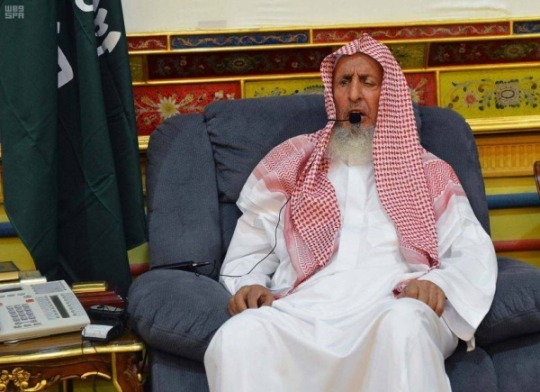
View On WordPress
0 notes